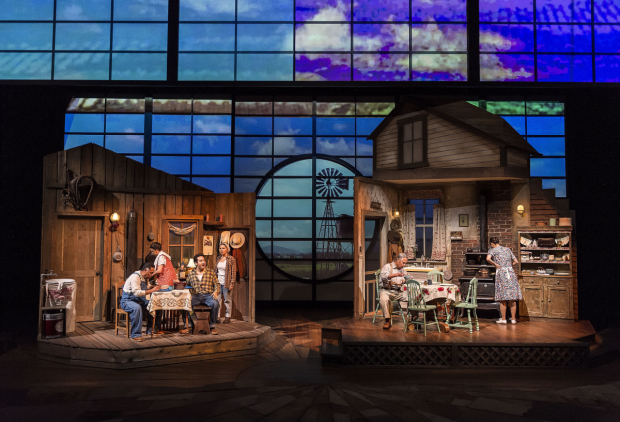A Reminder of the US's Shameful Past in Valley of the Heart
”Zoot Suit” playwright Luis Valdez directs his new production at the Mark Taper Forum.

(© Craig Schwartz Photography)
The image of innocents trapped behind the barbed-wire fences of American internment camps still burns in the minds of anyone absorbed in current affairs. Luis Valdez's Valley of the Heart reminds audiences that the latest drama taking place at our Mexican borders reflects a shameful period during World War II, when American citizens and legal aliens were rounded up like criminals and shipped to under-equipped, ghettoized prisons without due process, because the country they had left years or even generations past had declared war on the US. The bitter irony that America went to war to end fascism while practicing it at home is not lost on Valdez.
In early December 1941, two families work a fruit and vegetable farm in Cupertino, California. The Yamaguchis, whose two children were born in America, own the farm, while the Montaños, immigrants from Mexico, are sharecroppers who work the land. One of these workers, Benjamin Montaño (Lakin Valdez), has fallen in love with the Yamaguchis' daughter, Thelma (Melanie Arii Mah), though she has been promised to another. On December 7, both families' lives are upended by the Japanese attack on Pearl Harbor. Soon, Thelma and her family are shipped to internment camps in Los Angeles and then Wyoming, while a very special bond between the two families grows in Thelma's body.
Valdez's story unfolds in unexpected ways. But its strength is in the authenticity of the characters he has written. The tender relationship between Thelma and Benjamin becomes complicated as distance drives a wedge between them, giving audiences protagonists for whom to root. The characters of Thelma's parents, a father steeped in tradition and a mother who came to America as a mail-order bride, are trapped in unwinnable situations and fight for dignity when neither their home nor adopted land wants them. Even the promised suitor, who starts the play as the typical entitled rich college kid, becomes a defiant, well-drawn individual, angry at his untenable circumstance.
However, the play feels too conventionally plotted. Benjamin's parents, the alcohol-fueled but loving dad and the invested mother who functions to feed her kids, never rise above stereotypes. The dialogue causes the play the most issues. Situations that should feel penetrating instead have the characters talking like they're in a soap opera, which distances the audience from caring.
Lakin Valdez and Melanie Arii Mah both smooth out the clunky dialogue with compassionate readings. However, as a couple, their lack of chemistry complicates the play, as they never seem deeply in love enough for us to become invested in their relationship. As the Asian patriarch stripped of his land and self-respect, Randall Nakano is devastatingly powerful. As his wife, Joy Osmanski shows the dichotomy between a woman immobilized by an unjust and horrific situation, but willing to shift her views to keep her family alive. Both Justin Chien and Moises Castro have similar functions in the narrative as the Japanese and Mexican brothers to the protagonists who get swept up in the patriotism of their adopted land and choose to fight in the military. The two actors handle their roles well. Scott Keiji Takeda brings urgency to the jilted lover who evolves into an activist.
As a director, Valdez incorporates traditional Japanese culture into the stagecraft. Two kurokos move sets and manipulate puppets as they do in Kabuki theater. The curtain is made of translucent paper sliding doors, part of Japanese architecture. The musical underscore by PJ and Roy Hirabayashi has distinct Japanese influences and features instruments found in traditional music. Lupe Valdez's costumes for the protagonists feature autumn colors, muted and solemn. John Iacovelli's two sets, one a quaint home comfortably decorated and the other a cold shack, echo the characters' shifting socioeconomic statuses.
Valley of the Heart could not have come at a more vital time. The strife today mirrors many of our country's less proud incidents, like the rise of McCarthyism and the creation of Japanese internment camps. Had the play not relied on melodrama and had instead found a more innovative format, it could have left audiences shattered. Instead of reaching the top of the mountain, the playwright remained safe in the valley.










